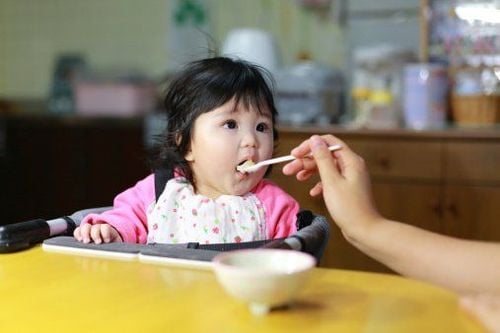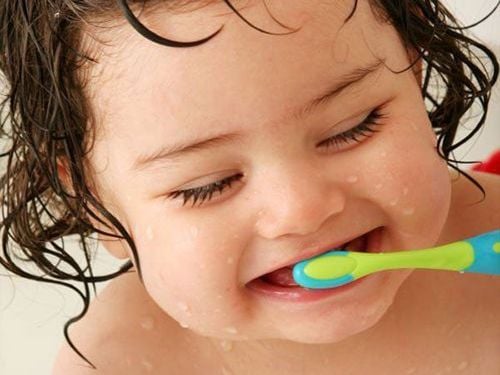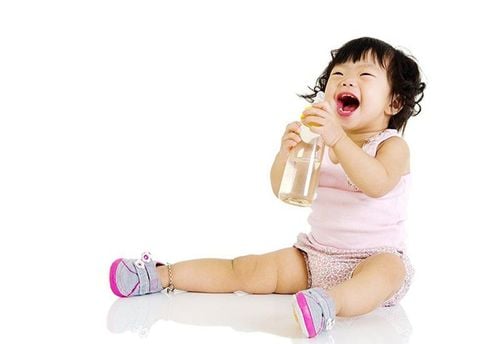This is an automatically translated article.
The article is professionally consulted by Master, Doctor Phan Ngoc Hai - Department of Pediatrics - Neonatology - Vinmec Da Nang International General Hospital
When children are 18 months old, in addition to milk and soups and porridges, children can begin to participate step by step in family meals. However, choosing which foods are appropriate, safe and rich in nutrients for children as well as how to take care of the teeth of 18-month-old babies are not known to all parents.
1. Required nutritional requirements of 18-month-old children
The nutrients that 18-month-old babies need at this age are varied and balanced; In particular, focus should be on the following food groups:
Iron: Consume iron-rich foods in your diet to ensure your baby's immune system works properly. These include vegetables like broccoli, spinach and kale regularly in your child's meals. Fat: Although the need for fat is no longer as high as it used to be, children still need to be provided with the right amount of fat every day. One serving of butter, half a tablespoon of cooking oil, or a cup of whole milk is a good way to do this. Protein: Protein is an essential nutrient for overall growth during a child's second year of physical development, not only for muscles but also for the health of skin, hair, nails and bones. . So make sure your child is always eating protein-rich foods with meals and snacks. Some of the high protein foods that parents can give their toddlers are milk, dairy products, eggs, meat, nuts, beans, etc. Calcium: Calcium is very important for the development of children. teeth and bones. Some good sources of calcium include dairy products, broccoli, kale, etc. At any stage of development, milk is important for a growing child. Therefore, even though children know how to eat well, they should still add a cup of whole milk daily for children.

Các chất dinh dưỡng mà trẻ 18 tháng tuổi cần thiết ở độ tuổi này là đa dạng và cân đối
2. Choice of foods for 18-month-olds
Food for 18-month-olds is no longer too specialized but can come from daily meals like other family members. However, the number of meals needed for children is 3 main meals and 2 extra meals, processing methods and spices need to be adjusted to suit the child's digestive system.
Here are the best foods to choose from for an 18-month-old baby :
Milk If your baby is still breastfed, this is a good thing because every baby is encouraged to breastfeed until 2 years old. In contrast, when the baby has been weaned from the mother's milk, the baby still needs to be replaced by drinking cow's milk.
Since milk is essential for the healthy development of teeth and bones, make sure your child is drinking at least one cup of milk daily. Moreover, children also need to learn to drink milk from cups and bottles instead of bottles to reduce the risk of tooth decay.
Fruits A small amount of fresh fruit in your child's breakfast is a great way to make sure he's getting essential nutrients. The way to prepare fresh fruit for children can initially be puree or fruit juice but they are not recommended because they do not have much fiber; It is still better to choose soft ripe fruits and cut them into bite-sized pieces for children.
Vegetables A lot of kids don't like to eat vegetables. Therefore, parents need to know how to prepare them into attractive forms such as making roasted carrot sticks or mashed potatoes.

Mọi đứa trẻ đều được khuyến khích bú sữa mẹ cho đến 2 tuổi
Meat and nuts Although this combination may not seem common, pairing the two together can meet the protein needs of an 18-month-old baby. Mothers can give chicken or fish with pieces of soybeans with attractive processing methods that do not cause boredom for children. However, novel protein sources can cause allergies in children, so parents need to be careful before combining them together when unsure.
Bread Avoid giving your child too much white bread. Instead, whole-wheat bread should be an alternative, providing essential groups of grains and vitamins for children.
Water Although water is not food, it also plays a very important role for children. Children often neglect to drink enough water, especially when playing. Therefore, parents need to pay attention to letting their children drink water when they are physically active continuously or the weather is hot and sweaty.
Cheese Along with milk, cheese or other dairy products are also essential to a child's daily diet. Different cheeses along with yogurt provide probiotics and other nutrients that plain whole milk may not always do. Luckily most kids love these products.
3. How to take care of your 18-month-old baby's teeth
Baby teeth come in at different times but the first teeth usually appear between 6 and 10 months. By the time the child is 18 months old, the child's teeth have grown at least ten baby teeth, including 4 lower and upper middle incisors, 4 lower and upper incisors and 2 first lower molars. Some babies can even have more upper teeth when they reach 18 months, so the total number of teeth will be 12.
Therefore, in addition to a complete diet, oral care for teething babies is also important. No less important. Only with healthy baby teeth can children eat enough nutrients and vice versa, providing enough food groups will help children have strong teeth along with good care to prevent baby tooth decay. Accordingly, oral care for an 18-month-old baby includes the following:
Regularly clean teeth and gums Children's teeth need to be cleaned at least twice a day, in the morning when they wake up and before they go to bed. However, the best thing is still that children brush their teeth after each meal. Children's toothbrushes should be small, soft-bristled and designed for children under two years of age. Initially, parents only need to brush their teeth with water until the child is 18 months old, unless specifically requested by the dentist. By 18 months, babies can start using a pea-sized amount of fluoride toothpaste with each brushing.

Răng trẻ cần làm sạch ít hai lần một ngày, vào buổi sáng thức dậy và trước khi đi ngủ
Proper brushing At 18 months, babies can start cleaning their own teeth. However, at first, parents need to hold the child's hand to hold the toothbrush to help the child have a better sense of the action with the following steps:
Stand or sit behind the child so that the child feels safe. Brushing in front of a mirror is recommended as it will allow the child to see his or her mouth. A child's hand holding a brush. Raise the child's grip with the other hand with the baby's head resting against his body. Point the bristles towards the gums. Move the brush in gentle circles to clean the outer and inner surfaces of teeth and gums. Brush back and forth on the chewing surfaces of the teeth. Gently brush your child's tongue. Ask your child to spit it out after brushing. When children learn to cooperate with this, they can start using toothpaste. Keep your toothbrush clean by rinsing it with tap water after cleaning your teeth and gums. Store your toothbrush properly, keep it upright in an open container to let it dry naturally. Children's toothbrushes should be replaced every 3-4 months or when the bristles are worn or frayed.
Periodic dental checkups One of the most important things about taking care of your child's teeth is to actively take them to the dentist every six months. To avoid fear and anxiety in children, it is necessary to create a belief in children that the dentist's job is to count teeth and make them have a bright smile. In the long run, children will not only have beautiful healthy teeth, but also will be able to detect early signs of tooth decay and jaw deviation for timely correction.
In short, when the child is 18 months old, ie 1 and a half years old, the child has relatively complete physical development, including the basic set of baby teeth. Accordingly, with the requirements for the above foods to provide for children and how to take care of their children's teeth, parents will also have the necessary knowledge to raise children to develop comprehensively.
In addition, parents should also apply some methods of changing habits and improving nutrition to support the child's teeth to develop better.
Besides, parents also need to supplement their children with essential micro-minerals such as zinc, lysine, chromium, selenium, vitamin B1, ... to fully meet the nutritional needs of children. The addition of these essential vitamins also supports digestion, enhances nutrient absorption, improves anorexia, and helps children eat well. Parents can simultaneously apply dietary supplements and functional foods derived from nature for easy absorption. The most important thing is that improving your baby's symptoms often takes a long time. The combination of many types of functional foods at the same time or continuously changing many types in a short time can cause the baby's digestive system not to adapt and completely not good. Therefore, parents must be really patient with their children and regularly visit the website vimec.com to update useful baby care information.














